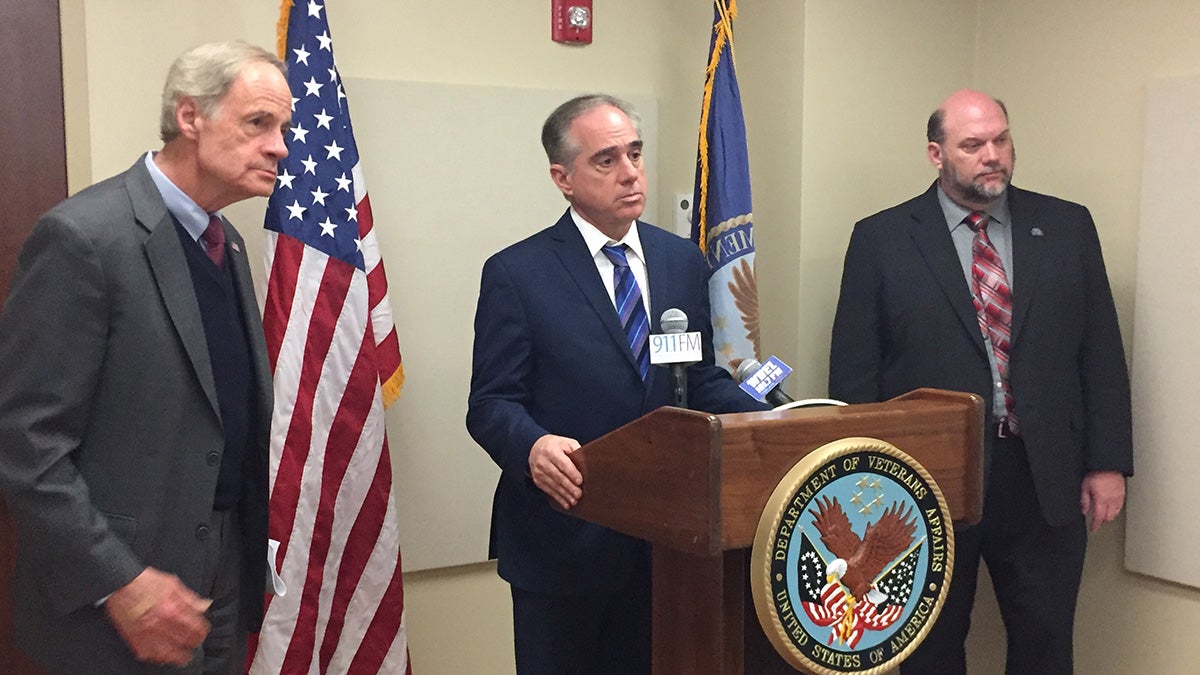U.S. Veterans Affairs secretary visits Wilmington VA hospital

(photo courtesy of Katie Wilson/Sen. Carper's office)
Secretary of Veteran Affairs Dr. David J. Shulkin visited the Wilmington VA Medical Center Monday.
On Monday, Secretary of Veteran Affairs Dr. David J. Shulkin visited the Wilmington VA Medical Center to take part in a roundtable discussion with leaders in the veteran community, and Delaware’s congressional leaders.
Every year U.S. Senator Tom Carper, D-Delaware, hosts the veteran summit to hold conversations with stakeholders about the state’s successes and shortfalls in the area of veterans affairs, and to receive feedback from various groups on how to improve.
This was the second visit for Shulkin, who was nominated by President Donald Trump to serve as Secretary and confirmed unanimously by the U.S. Senate in February.
“The issues we’re really focused on is, first of all, getting accountability in the VA to make sure we have the right leaders in place, we’re focused on modernizing our system to make sure we have world class facilities for our veterans and we’re focused on making sure our choice program that expires this year will be extended, and we can keep that a permanent part of our program,” he said.
“And finally, our biggest clinical priority right now is preventing veteran suicide, and that’s where we need help from all our community members working with the VA to make sure anybody in need knows the VA is here to help them.”
Shulkin said of 20 veteran suicides a day, 14 individuals aren’t receiving care in the VA health system. He said while the veteran hotline is available to those in need 24 hours a day, his agency also is working with national experts to establish best strategies, including improving the ability to identify at-risk veterans and intervene early.
“We’re reaching out to community groups, because we know the VA can’t do this alone,” Shulkin said.
He also said he wants to ensure the agency’s Veterans Choice program, which expires this year, will be extended. President Barack Obama signed the initiative into law so military veterans may receive care from private doctors if Veterans Affairs facilities have excessive wait times.
“I’m not in favor of privatizing, but I am in favor of giving veterans greater choice. We’re going to make it easier for veterans to go into the community when the VA isn’t able to provide the care or doesn’t have the level of service of care veterans need,” Shulkin said.
“This is going to be an integrated system of care between what the VA has, and working with the private sector and other federal healthcare facilities as well.”
He said the agency also plans to simplify the way it measures wait times at VA hospitals, which have come under public scrutiny in Delaware and the U.S. over the last few years.
Robert Callahan, acting director of the Wilmington VA, said customer services had previously been outsourced, as VA hospitals didn’t have provider agreements. Since October, Veterans Affairs has picked up more than 300 provider agreements, and wait times have improved, he said. While more strides need to be made, Callahan said behavioral health is a number one concern for the hospital.
“If a veteran needs to be seen today, we’ll get them seen today,” he said.
Shulkin also is pushing for legislation to improve accountability among employees in the VA health system. Last year USA Today obtained private documents detailing ratings for hospitals, with the one in Wilmington on the list of low-performance institutions. When no apparent improvements were made, the medical center’s director was replaced. Shulkin said he believes setting accountability standards will improve the hospital’s quality.
Carper said turnover in leadership also has been a constant concern, and he believes Shulkin will continue to ensure stability.
“We have stability with our leadership, and with our secretary, he’s going to be secretary for a long time and can provide stability in the leadership needed, say, ‘This is our vision, this is where we’re going,’ and folks in our trenches won’t say, ‘He or she will be gone in six months or 12 months,” he said.
WHYY is your source for fact-based, in-depth journalism and information. As a nonprofit organization, we rely on financial support from readers like you. Please give today.





